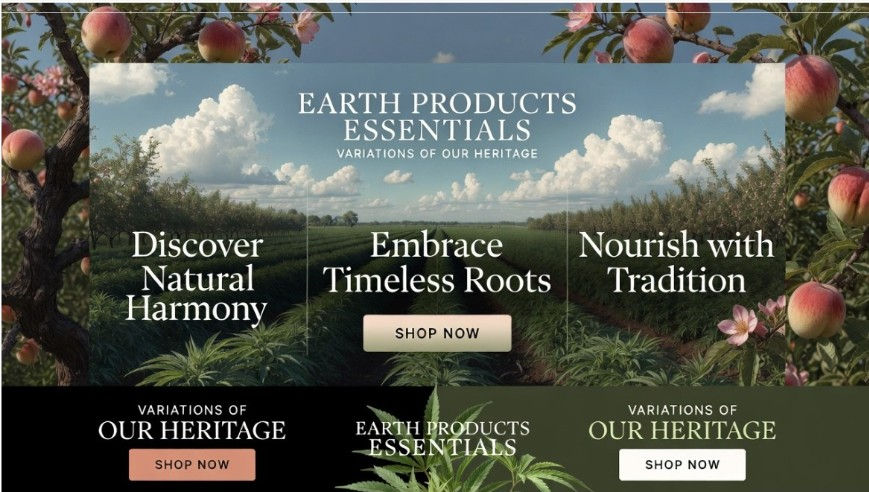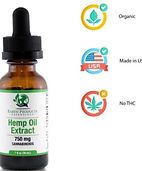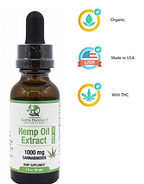STAY IN THE KNOW - JOIN OUR NEWSLETTER
ALL OF OUR PRODUCTS
BEST SELLERS FROM SHOWS
What Our Customers Are Saying
The products are amazing. They've become a wonderful addition to our family's daily wellness routine. There aren't enough words to express how thankful I am for this family-owned business that brings high-quality options to us right here in the USA. Our family is ever grateful.AMI BellaVerified Buyer
V
Vincent V
Verified Buyer
I've been buying CBD and other products from Earth Products Essentials for at least three years. The CBD products are outstanding and a great addition to my wellness routine. The CEO of this company could write a book on customer service! I was out of CBD and needed some delivered quickly. He said he'd be in my area tomorrow and personally delivered it to my home, along with some samples of their other products. Vincent V
Ronnie Corropolese
Verified Buyer
I started incorporating CBD into my 12-year-old dog's routine, and it's been wonderful. He's more playful and energetic, enjoying his toys like a puppy. What a blessing! Ronnie Corropolese
H
Julie Hiles
Verified Buyer
Love this brand. Their CBD oil has been a great addition to my cat's and small dog's routines. They're so much more mellow now. Love these products!
G
Stephen Godwin
Verified Buyer
I’ve been using their hemp massage oil, and it's a great addition to my relaxation routine.
3rd Party Tested
A South Jersey Leagacy: From the Farm to Your Wellness
The Adamucci family has proudly farmed Cumberland County for generations — growing the finest peaches, nectarines, and berries through Adamucci Farms Inc. My father Nicholas Adamucci Sr. and I built that legacy with hard work and integrity. My uncle Frank Adamucci Sr. was one of South Jersey’s most respected developers, helping shape communities here and in Florida.
After retiring, I started Earth Products Essentials in 2016 to bring that same multi-generation family pride to small-batch, farm-made full-spectrum CBD — clean, honest wellness straight from Port Norris, New Jersey.
We’re not newcomers. We’re your local Adamucci family — here for the long haul.

WHAT IS CBD?
CBD, or cannabidiol, is a naturally occurring cannabinoid found in the Cannabis sativa plant. It is one of over 100 such compounds identified in cannabis and is distinct from THC, the primary psychoactive component that causes intoxication. CBD itself is non-intoxicating and does not produce a "high." It can be derived from hemp, which is legally defined under the 2018 Farm Bill as any part of the Cannabis sativa L. plant with a delta-9 THC concentration of no more than 0.3% on a dry weight basis. CBD is commonly used in a variety of consumer products, such as oils, tinctures, and topicals.

WHAT IS CBG?
CBG, or cannabigerol, is a naturally occurring cannabinoid found in the Cannabis sativa plant. Often referred to as the "mother of all cannabinoids," it serves as a precursor to other compounds like THC and CBD during the plant's growth cycle. CBG can be extracted from hemp varieties of cannabis, which are legally defined by the 2018 Farm Bill as containing no more than 0.3% delta-9 THC on a dry weight basis. Unlike THC, CBG is non-intoxicating and does not produce psychoactive effects. It is commonly incorporated into various wellness and consumer products.

WHAT IS CBN?
CBN, or cannabinol, is a naturally occurring cannabinoid found in the Cannabis sativa plant. It is typically formed through the oxidation and degradation of THC, the plant's primary psychoactive compound, as cannabis ages or is exposed to light and air. CBN is considered mildly psychoactive but is generally non-intoxicating and does not produce the euphoric "high" associated with THC. It can be derived from hemp, which is legally defined under the 2018 Farm Bill as any part of the Cannabis sativa L. plant with a delta-9 THC concentration of no more than 0.3% on a dry weight basis. CBN is commonly used in various consumer products, such as tinctures, edibles, and topicals.

WHAT ARE TERPENES?
Terpenes are aromatic organic compounds found in many plants, including Cannabis sativa, where they contribute to the unique scents, flavors, and characteristics of different strains. Produced in the plant's resinous glands (trichomes), they serve natural functions like repelling pests or attracting pollinators, with over 200 varieties identified in cannabis. Common examples include myrcene (earthy, herbal notes), limonene (citrusy), pinene (pine-like), linalool (floral), and caryophyllene (spicy, peppery). In hemp-derived products like oils, tinctures, and topicals, we use terpenes to enhance sensory experiences, allowing customers to enjoy tailored aroma and flavor profiles similar to those in essential oils or aromatherapy.





































